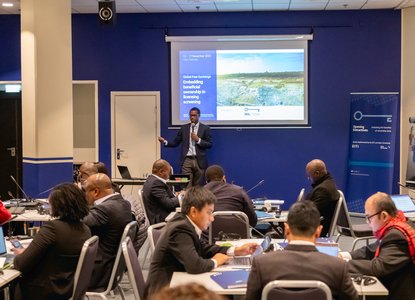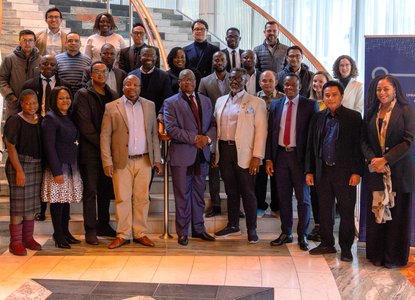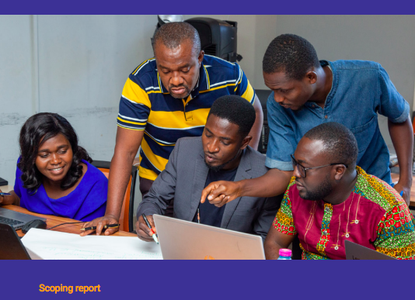Ghana: Unlocking ownership data for accountability in the extractive sector

Impact of Opening Extractives in Ghana: Unlocking ownership data for accountability in the extractive sector
Key messages
- Ghana has digitised its beneficial ownership register and strengthened compliance, making ownership data more accessible and transparent. Since the launch of Opening Extractives in 2021, the number of declarations has risen from 24,256 to 175,984 as of 30 September – an increase of over 600%, marking significant progress in corporate transparency and disclosure.
- Opening Extractives supported legal implementation, data collection and quality, and integration of ownership data into licensing, permitting and contracting decisions.
- Government agencies now coordinate more effectively, with improved capacity to collect and use ownership data.
- Civil society and journalists are using ownership data to expose corruption risks and strengthen public oversight.
The challenge: Addressing hidden ownership and enforcement gaps in Ghana’s extractive sector
Ghana’s extractive sector remains a critical source of public revenue, with mining contributing around one tenth of government income in 2024. While Ghana has implemented the Extractive Industries Transparency Initiative (EITI) since 2007, opaque company ownership structures have fuelled risks of corruption, tax evasion and conflicts of interest, particularly in the awarding of licenses and the monitoring of company operations. In one case, a license was granted to a company whose directors were later found to have criminal convictions abroad – issues only uncovered during the renewal process in 2020.
Addressing these risks has been a national priority to strengthen transparency and accountability in resource governance. Although Ghana’s 2019 Companies Act established a legal foundation for beneficial ownership disclosure, challenges in data quality, inter-agency coordination and public access to ownership data persisted. The Office of the Registrar of Companies (ORC) (previously the Registrar General's Department) began collecting ownership data in 2020, building on earlier efforts by Ghana EITI. However, enforcement remained inconsistent and ownership data was not routinely used in decision-making.
To accelerate reforms, Ghana joined the Opening Extractives (OE) programme in 2021. A scoping report outlined targeted interventions needed to strengthen beneficial ownership reforms. The programme – jointly implemented by the EITI and Open Ownership – has since supported concrete reforms that improved data quality, strengthened institutional coordination and laid the foundation for more effective use of ownership data.

Shutterstock: Ghanaian cedi notes and lump of gold
Results and impact
1. Building towards a stronger digital register for beneficial ownership
Opening Extractives has supported Ghana’s shift from a partially paper-based process towards a digitised system for collecting and sharing ownership data. By working with the ORC, the programme is contributing to the development of a new digital business registration system that is improving data quality and enabling better information-sharing across government. The register is expected to be fully functional by 2026.
- Wider coverage: As of September 2025, more than 175,984 companies had filed their beneficial ownership data with the ORC – up from 24,256 companies in 2021.
- Improved data quality: OE supported updates to beneficial ownership reporting forms, improving clarity and structure and aligning with international standards. Capacity building for ORC staff has enhanced their ability to review and quality-assure submitted data, including by responding to queries from companies during the filing process. Over 60 national and subnational ORC officials received training on data verification, ownership structure analysis and registry management.
- Building technical foundations for long-term impact: OE has collaborated with the developers of the new digital register to ensure the system reflected the legal and policy requirements for beneficial ownership. Early engagement helped align technical design with Ghana’s transparency reforms and supported the system’s long-term effectiveness.
“The programme made us realise the importance of using beneficial ownership data not just for compliance, but as a vital tool for enhanced due diligence […]. Access to this data could strengthen the Minerals Commission’s ability to assess license applicants, reduce corruption risks and make more informed decisions. This transparency would support responsible resource management and contribute to a fairer and more accountable extractives sector in Ghana.” – Ahmed Tijani, Manager of Corporate Affairs and Information Technology, Minerals Commission Ghana
2. Integrating ownership data into licensing due diligence
Opening Extractives has helped build momentum in raising awareness for integrating beneficial ownership data into licensing processes in Ghana’s extractive sector. This has been a key focus particularly in strengthening the capacity of regulators to use ownership information in licensing decisions and due diligence.
- Pilot framework for screening licenses: OE developed a due diligence tool to help licensing authorities assess extractive license applications using ownership data. A team from the Minerals Commission tested the framework on five active licenses, demonstrating its potential to flag risks and improve decision-making. While full integration is still underway, this work has laid the foundation for embedding ownership checks in licensing procedures.
- Regulatory integration: OE facilitated dialogue between key oversight bodies – including the Minerals and Petroleum Commissions and the ORC – to explore how data systems and decision-making processes can be better aligned. These discussions have helped consolidate lessons and identify next steps for embedding checks into due diligence processes.
- Capacity building: National and subnational training programmes have increased awareness of how ownership data can support more informed licensing decisions. OE has worked closely with licensing authorities to assess their needs and ensure systems are equipped to incorporate ownership data into standard screening procedures.
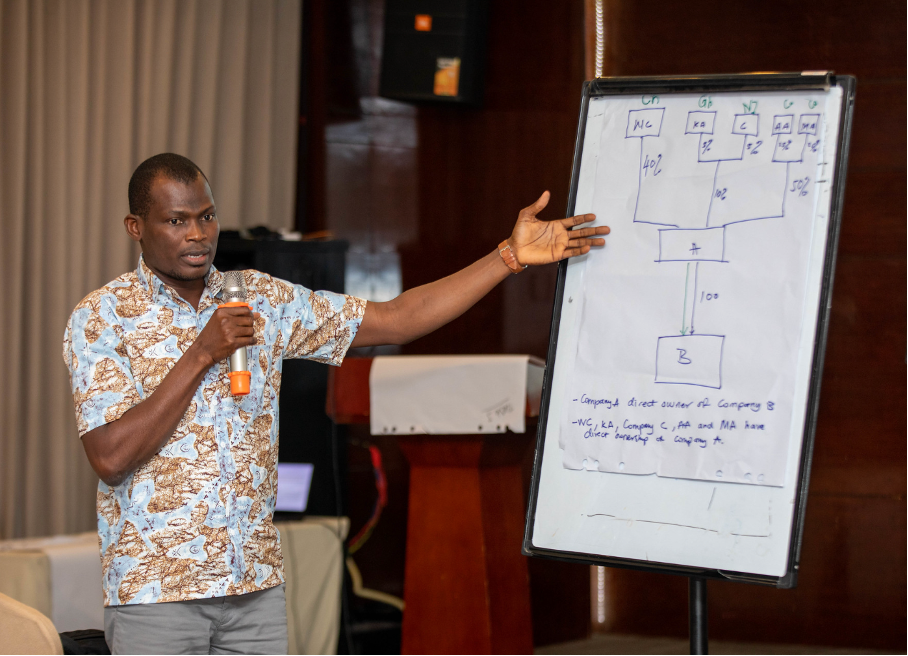
Opening Extractives workshop for the Minerals and Petroleum Commission in Ghana, July 2024
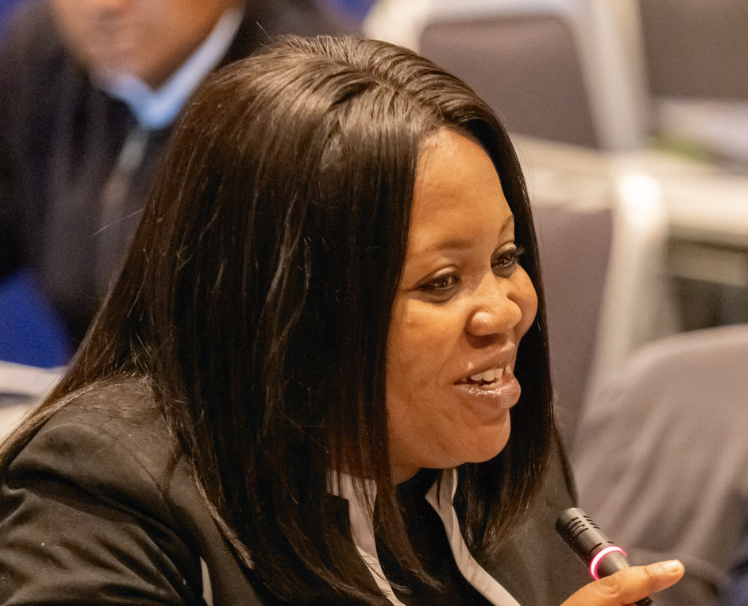
Lysbeth Omane, Senior State Attorney, Office of the Registrar of Companies
“The programme has been successful in making beneficial ownership a topic of conversation among government officials. […] Workshops, webinars, public awareness campaigns on the television and radio, printed materials and posters have constituted successful strategies for raising awareness about beneficial ownership transparency, particularly in Ghana and stakeholders working in the natural resource governance space.” – Lysbeth Omane, Senior State Attorney, Office of the Registrar of Companies
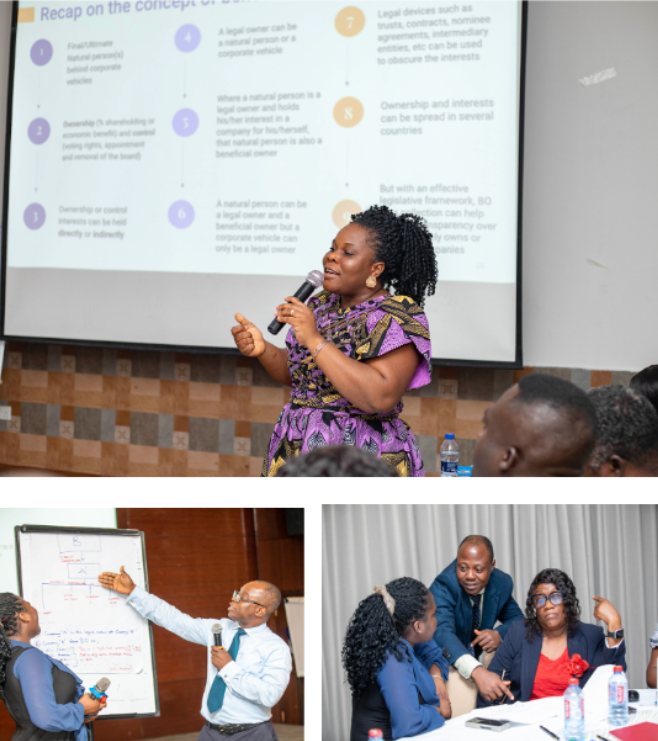
First picture in the collage: Opening Extractives training on data use for the staff of the Office of the Registrar of Companies and selected Integrity and Anti-Corruption Authorities in Ghana, November 2023. Second and third photos: Opening Extractives workshop for the Minerals and Petroleum Commission in Ghana, July 2024
3. Data use for public accountability
The OE programme has supported investigative journalism and civil society initiatives that use beneficial ownership data to uncover corruption risks and illicit financial flows, leading to more informed advocacy and greater public oversight.
- Royalty gaps and hidden owners: An investigation by Ghanaian journalists in Krobo region revealed widespread non-payment of royalties, the presence of unlicensed quarry operators, and companies with unclear ownership structures. The findings also highlighted weak enforcement and limited community benefit from extraction.
- Public officials’ interest in fisheries: Journalists have used ownership data to uncover undisclosed interests held by politically exposed persons in Ghana’s fisheries sector, revealing how opaque ownership arrangements were used to bypass regulations and secure state contracts.
- Illegal foreign ownership in fisheries: The “Leaking Trawlers” project, led by Ghanian investigative journalists, exposed illegal foreign ownership in Ghana’s fishing industry, despite regulations prohibiting foreign trawlers.
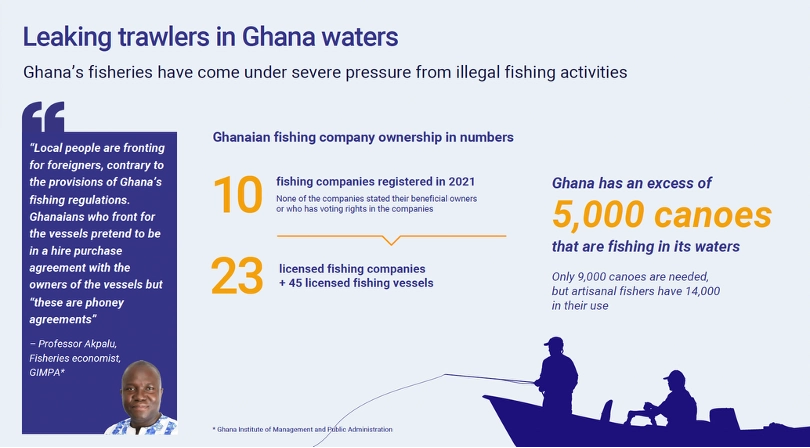
Screenshot of infographic on Leaking Trawlers by Professor Akpalu, Ghana 2022
“Beneficial ownership data is a powerful tool for accountability. It helps journalists uncover hidden interests and hold powerful actors to account, especially in sectors like mining where public resources are at stake. […] The programme created a space for journalists to exchange ideas and strategies on how to report on beneficial ownership in ways that resonate with the public.” – Bismark Ayorogo, Executive Director at Northern Patriots in Research and Advocacy (NORPRA)
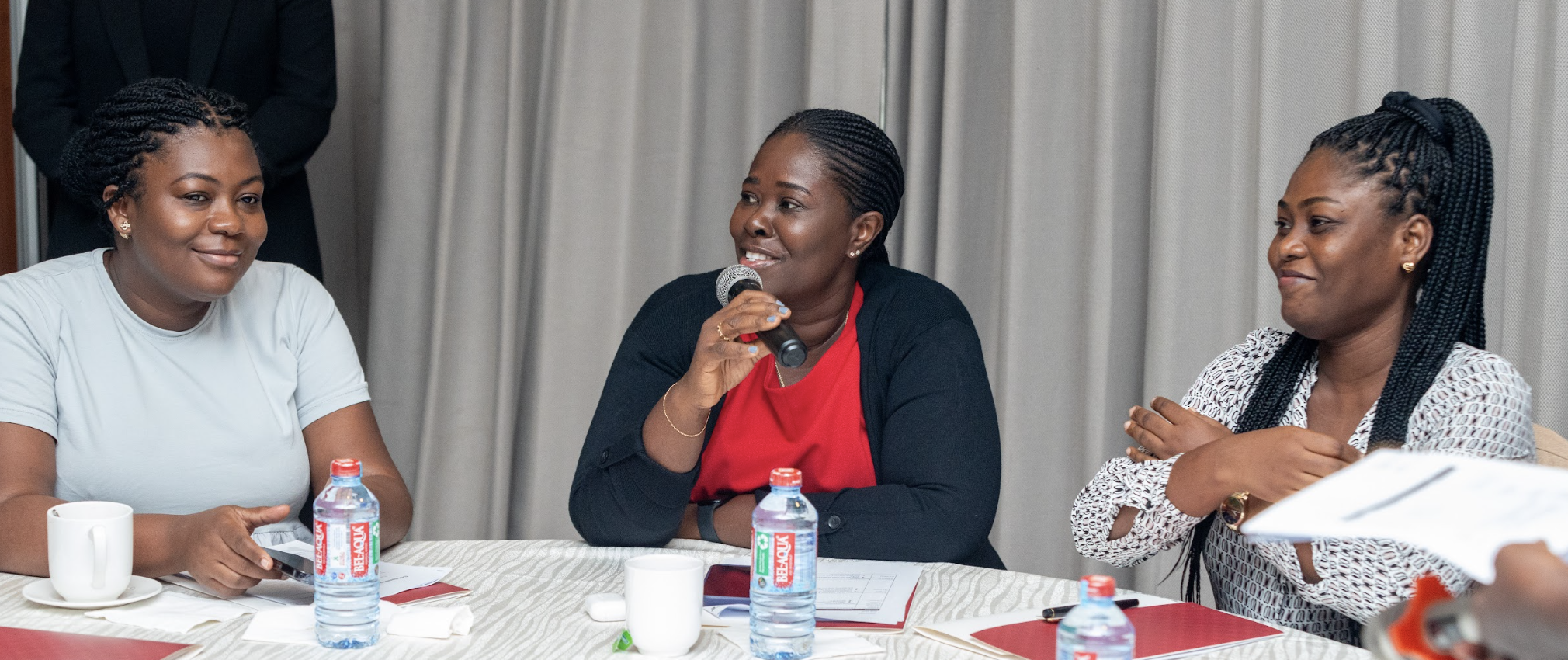
Opening Extractives workshop for the Minerals and Petroleum Commission in Ghana, July 2024
Conclusion
Ghana’s commitment to beneficial ownership transparency is setting a benchmark for accountability in the extractive sector. With targeted support from the Opening Extractives programme, the country has strengthened legal frameworks, improved data integrity and laid the groundwork for more responsible governance in the upstream extractive sector.
Ghana’s reforms are informing global practice, including in peer countries like Nigeria, and offer a model for integrating ownership data into oversight systems. As implementation continues, the focus will be on fully operationalising the digital register, embedding ownership checks into licensing processes and enhancing enforcement.
Ghana’s experience also illustrates the broader relevance of ownership transparency across the value chain. While recent progress has focused on licensing and upstream disclosures, cases of alleged corruption in the downstream petroleum sector persistent governance challenges in artisanal and small-scale mining highlight the need to extend these reforms to midstream and downstream operations. Ghana is well positioned to apply lessons from the extractive sector to strengthen integrity across the broader economy.
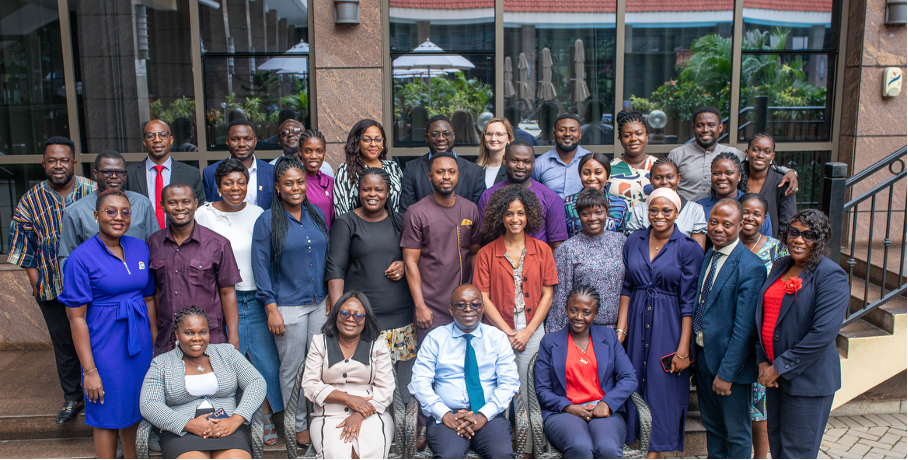
Opening Extractives workshop for the Minerals and Petroleum Commission in Ghana, July 2024
Key documents and more
- Beneficial ownership transparency in Ghana: The current regime and next steps (scoping report)
- Infographic on beneficial ownership transparency in Ghana
- Infographic on beneficial ownership transparency in Anglophone Africa
- Turning the public eye on company ownership in Ghana
Funding
The Opening Extractives programme is made possible with the generous support of the BHP Foundation.
This impact story includes contributions from Louise Russell-Prywata (Deputy Executive Director, Open Ownership), Favour Ime (Senior Regional Manager, Open Ownership), Isabelle Kermeen (Communications Manager, Open Ownership), Williams Noah (Country Officer, EITI), Alice Perepyolkina (Communications Officer, EITI) and Leila Pilliard (Communications Manager, EITI), Edwin Wuadom Warden (Country Manager, EITI).
